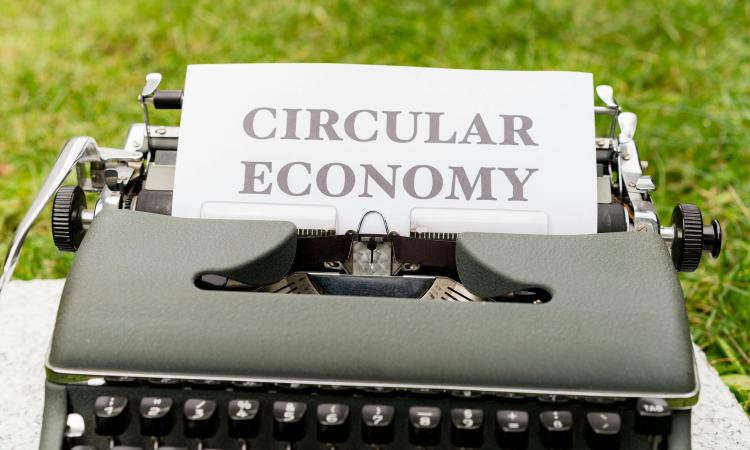
The G20 Leaders' Declaration from New Delhi demonstrated India's expanding power and ambitions to support stability and good global governance. India's endeavour to maintain a balance between its domestic interests and its global obligations distinguishes its place in the evolving geopolitical landscape. It was an important turning point in presenting India as a world leader. India emphasised the significance of fortifying multilateral institutions through the declaration. This occurred at a time when worries about protectionism and unilateralism are spreading around the globe.
In the last five years, there has been a 21% fall in worldwide circularity, from 9.1% in 2018 to 7.2% in 2023. It is necessary to switch from the conventional linear (from cradle to grave) processes to the circular (from cradle to cradle) processes, making sure that every result serves as an input for another process.
India has the potential to be a key player in enabling the global circular transformation due to its distinctive blend of geopolitical relevance, traditional sustainable practices, and active diplomatic relations. India is the largest democracy in the world and one of the most populous countries, thus its policies and actions are taken very seriously. India possesses a distinct position due to its longstanding connections with nations in the Global South, which have been strengthened by movements such as the Non-Aligned Movement, BRICS, and vaccination diplomacy amidst the crisis.
“We can leverage these relationships to promote the circular economy model, emphasising mutual benefits in terms of sustainable growth, job creation, and environmental preservation”, said Ms Shalini Goyal Bhalla at the opening plenary of the third edition of India Circular Economy Forum (ICEF2024) in New Delhi. Ms Bhalla is the Managing Director at the International Council for Circular Economy, an Indian think-tank.
The recent efforts to foster relationships through several initiatives with African, south-east Asian and Latin American countries show our commitment to strengthening ties with the Global South. These engagements can serve as platforms for knowledge sharing, technological collaboration, and financial mechanisms that support circular economy transitions, she added.
“India can provide momentum towards achieving global development, environmental, and climate goals while respecting the diverse national circumstances and capabilities of countries, especially the developing ones. Our dual identity as a developing economy with global influence positions it uniquely to provide impetus for a balanced approach to development, environment, and climate goals. Its right time to advocate actions that can resonate with developing countries, making it a significant player in shaping the global agenda”, said Mr Bhaskar Chatterjee.
The two-day India Circular Economy Forum (ICEF2024) concluded with a resounding success, marking a pivotal moment in India's journey towards becoming a global leader in circular economy practices. With insightful discussions, innovative showcases, and strategic collaborations, the event underscored India's potential to lead the Global South in the circular transition.
The industry itself needs to identify gaps in the application of circularity,” emphasised Mr. Michael Bucki, Head of Department, at the EU delegation to India. He introduced the Indian concept of "Jugaad" as a driving force for circularity in India, highlighting its innovative and resourceful nature.
Smt. Rupinder Brar, Additional Secretary, Ministry of Coal, GoI, stressed the need for new technologies in carbon capture and storage that are market-relevant and cost-effective. She highlighted her ministry’s work in responsibly closing mines to restore reclaimed sites for nature, flora, and fauna, which supports Just Transition. She shared that 32 out of 39 coal sites have been converted into water bodies and tourist sites in India.
Mr. Rohit Kansal, Additional Secretary, Ministry of Textiles, GoI, mentioned the presence of 900 dedicated textile recycling units, with recycling hubs in Panipat while numerous others in Gujarat, Tamil Nadu, and Maharashtra that have regular recycling mechanisms. He highlighted the role of women entrepreneurs in leading these initiatives and the importance of reuse and upcycling in fashion through craftsmanship. “We must focus on four R's: Reuse, Reduce, Recycle, and Redesign to transition the highly polluting textile industry to a sustainable sector”, said Mr Kansal.
Mr. Amit Verma, Director, NITI Aayog, highlighted the challenges and opportunities associated with circularity in India. He began by underlining the government's commitment to this sustainable approach. Mr. Verma discussed the establishment of committees by Niti Aayog in 2021, with preparatory work starting as early as 2019, to specifically address circularity. He emphasised the comprehensive involvement of various ministries, with a regulatory role played by the Ministry of Environment, Forest and Climate Change (MoEFCC), focusing on 11 key sectors including scrap metal, lithium-ion batteries, gypsum, and solar panels.
Mr. Kimmo Lahdervita, Ambassador ,Embassy of Finland ,emphasised the transformative potential of the circular economy, highlighting Finland's leadership in this domain. He outlined Finland's commitment to fostering innovation, economic growth, and sustainability through circular practices. Mr. Lahdervita detailed Finland's ambitious goals for achieving a low-carbon economy by 2035, showcasing the country's pioneering efforts in integrating circular economy principles into various sectors.
Highlighting and showcasing Indian innovations and technology, the forum saw participation from almost 500 delegates with over 70 speakers from industry. It has successfully set the stage for emphasising strategic collaborations and regulatory frameworks as key drivers of circular practices in India and at the global stage.
For more information, please visit https://ic-ce.com/icef2024/
About ICCE: The International Council for Circular Economy (ICCE), a four-year-old Think-tank, was established in 2020 as a section-8 company. With the ethos of transparency, ICCE has been built on 3 important pillars of Educate, Innovate and Inspire. With a resolute mission, ICCE is dedicated to expediting the transition to a restorative and regenerative economic model that emphasises circularity at its core.
/articles/india-should-be-spearheading-circular-shift-global-south